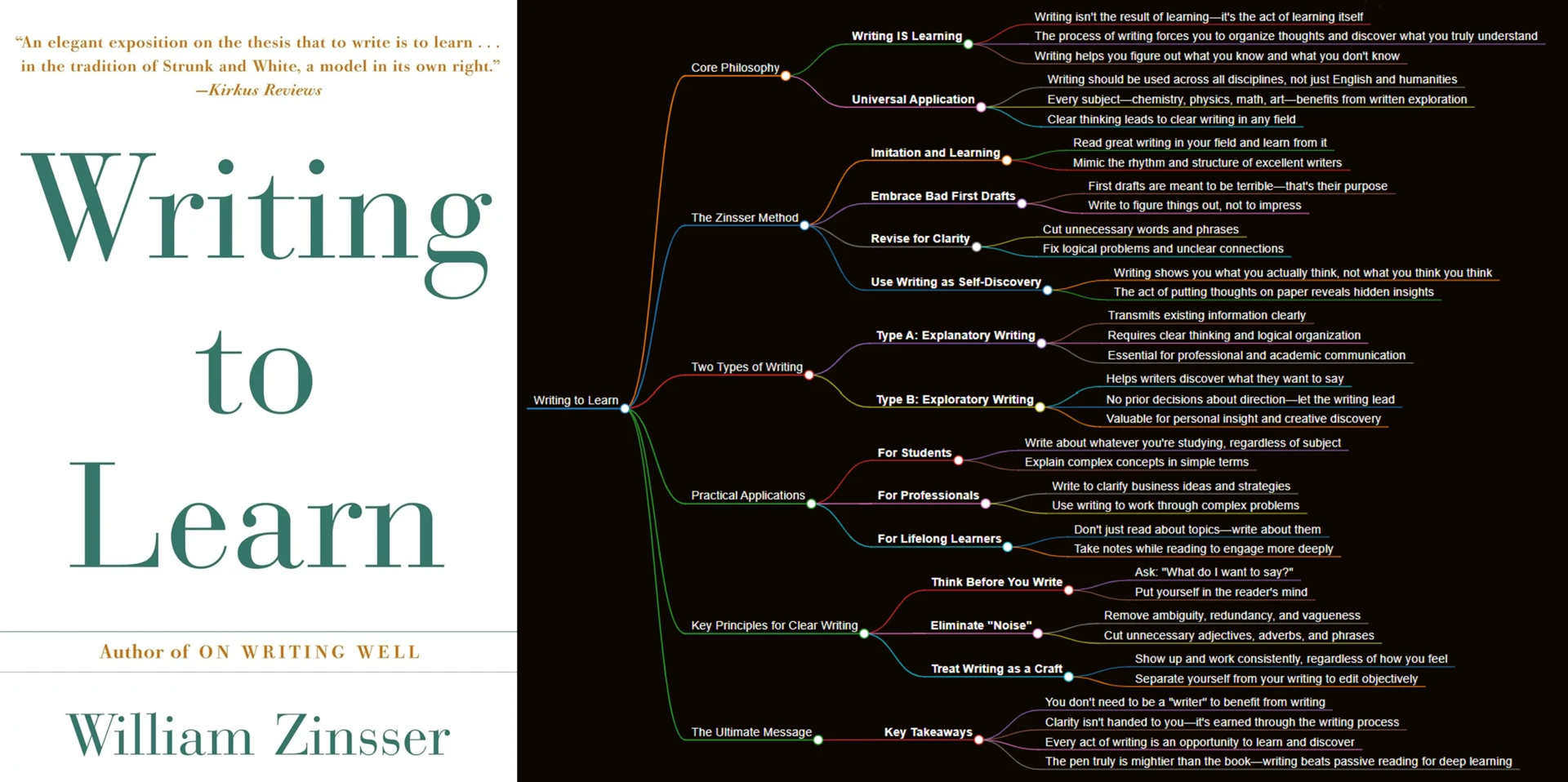Writing to Learn (Book Summary)
"Writing is thinking on paper. Anyone who thinks clearly should be able to write clearly—about any subject at all."
Core Philosophy
- Writing IS Learning
- Writing isn't the result of learning—it's the act of learning itself
- The process of writing forces you to organize thoughts and discover what you truly understand
- Writing helps you figure out what you know and what you don't know
- Universal Application
- Writing should be used across all disciplines, not just English and humanities
- Every subject—chemistry, physics, math, art—benefits from written exploration
- Clear thinking leads to clear writing in any field
The Problem with Traditional Education
- Writing as Performance vs. Learning
- Schools turn writing into testing rather than learning
- Students write for grades and approval, not exploration and understanding
- Over-policed essays with rigid structure kill creativity and genuine learning
- Subject Isolation
- Writing relegated primarily to English and history classes
- Science, math, and other subjects miss opportunities for written exploration
- Creates artificial barriers between disciplines
- False Beliefs About Writing Ability
- Students taught that you're either "good at writing" or not
- This belief calcifies into adulthood, creating "I'm not a writer" mindset
- Prevents people from using writing as a learning tool
Writing Across the Curriculum
- Science and Mathematics
- Chemistry students writing essays about discoveries that changed the world
- Math students explaining solutions and why they work
- Physics concepts become clearer when written about in plain language
- Arts and Humanities
- Art history students making visual concepts accessible through writing
- Music students explaining theory to non-musicians
- Anthropologists making observations comprehensible to general audiences
- Benefits for All Fields
- Students understand their subjects more completely
- Writing reveals gaps in knowledge and understanding
- Complex concepts become clearer through written explanation
"Writing organizes and clarifies our thoughts. Writing is how we think our way into a subject and make it our own."
The Zinsser Method
- Imitation and Learning
- Read great writing in your field and learn from it
- Mimic the rhythm and structure of excellent writers
- Great artists steal—adapt what works for your own writing
- Embrace Bad First Drafts
- First drafts are meant to be terrible—that's their purpose
- Write to figure things out, not to impress
- The messy process of discovery is where real learning happens
- Revise for Clarity
- Cut unnecessary words and phrases
- Fix logical problems and unclear connections
- Make every sentence do meaningful work
- Use Writing as Self-Discovery
- Writing shows you what you actually think, not what you think you think
- The act of putting thoughts on paper reveals hidden insights
- Writing becomes a mirror for your own understanding
Two Types of Writing
- Type A: Explanatory Writing
- Transmits existing information clearly
- Requires clear thinking and logical organization
- Essential for professional and academic communication
- Type B: Exploratory Writing
- Helps writers discover what they want to say
- No prior decisions about direction—let the writing lead
- Valuable for personal insight and creative discovery
Practical Applications
- For Students
- Write about whatever you're studying, regardless of subject
- Explain complex concepts in simple terms
- Use writing to test your understanding of material
- For Professionals
- Write to clarify business ideas and strategies
- Use writing to work through complex problems
- Document learning and insights for future reference
- For Lifelong Learners
- Don't just read about topics—write about them
- Take notes while reading to engage more deeply
- Summarize and reflect on new information through writing
Key Principles for Clear Writing
- Think Before You Write
- Ask: "What do I want to say?"
- Put yourself in the reader's mind
- Ensure each sentence is absolutely clear
- Eliminate "Noise"
- Remove ambiguity, redundancy, and vagueness
- Cut unnecessary adjectives, adverbs, and phrases
- Guard your message from pollution by clutter
- Treat Writing as a Craft
- Show up and work consistently, regardless of how you feel
- Use your tools (pen, computer) like any craftsperson
- Separate yourself from your writing to edit objectively
"If you force yourself to think clearly you will write clearly. It's as simple as that. The hard part isn't the writing; the hard part is the thinking."
Modern Relevance
- Information Age Applications
- More relevant than ever in our age of information overload
- Writing helps filter and organize overwhelming amounts of data
- Essential skill for navigating complex professional environments
- Beyond Formal Education
- Valuable for business development, coding, project management
- Helps entrepreneurs clarify their vision and strategy
- Enables better communication with clients, teams, and stakeholders
- Personal Development
- Writing exposes weak spots in thinking and arguments
- Strengthens reasoning and analytical abilities
- Provides clarity in an age of hot takes and quick judgments
The Ultimate Message
"We write to find out what we know and what we want to say. Writing organizes and clarifies our thoughts. Writing is how we think our way into a subject and make it our own."
- You don't need to be a "writer" to benefit from writing
- Clarity isn't handed to you—it's earned through the writing process
- Every act of writing is an opportunity to learn and discover
- The pen truly is mightier than the book—writing beats passive reading for deep learning
